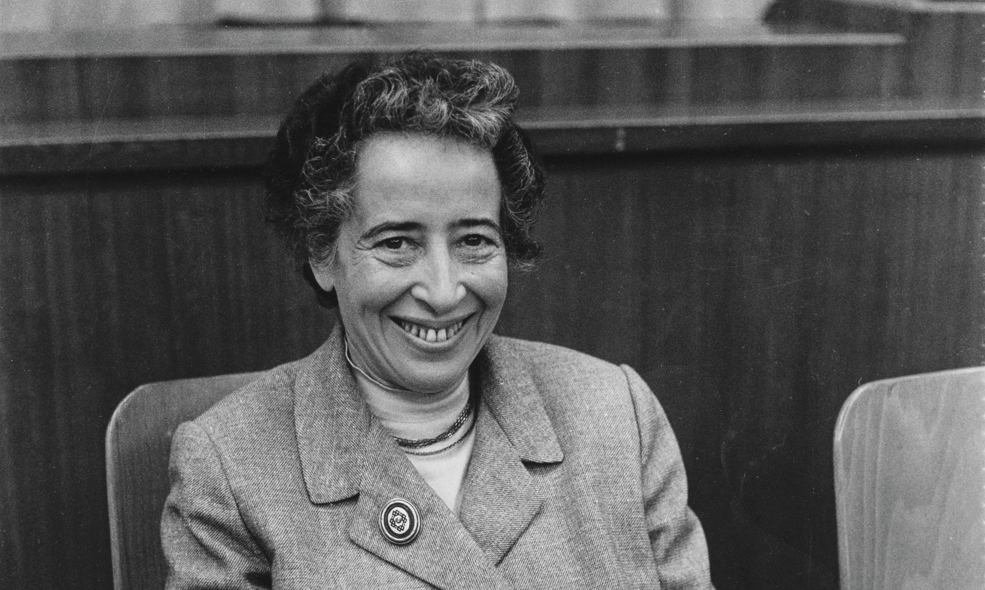
Photo by Barbara Niggl Radloff - sammlungonline.muenchner-stadtmuseum.de
Political philosopher and Holocaust survivor Hannah Arendt (1906–1975) was born into a German-Jewish family. After high school she attended Marburg University, where she became a student of the philosopher Martin Heidegger. She had a short love affair with him.
She then moved to Heidelberg University, where she completed her doctorate on “The Concept of Love in St. Augustine” under the philosopher Karl Jaspers. Her favorite passage from Augustine was taken from the Confessions. She observed how, reflecting on what it means to lose a friend who died, St. Augustine “became a question to himself” because of the loss. (Love and Saint Augustine)
Indeed, throughout her writings she continually examines how we as human persons are like cyphers needing continual decoding. The human being is not some abstract static notion, but uniquely personified or even “de-personified” in each one of us.
This emerges clearly in one of her most famous and controversial writings reporting on the trial of the Nazi leader Adolf Eichmann. These appeared initially as articles in The New Yorker and were eventually published as Eichmann in Jerusalem: A Report on the Banality of Evil.
The politics of the person
What is most revelatory about Hannah Arendt are not necessarily her reflections on totalitarianism (see The Origins of Totalitarianism) or specifically on Eichmann, but her insights into the “politics” of the person.
Politics is, she contends, constitutive of who we are. For her politics is the essential space where we as human beings unfold our identity. Politics occupies a public space and is where we as human beings are made visible. It is integral to who we are, and we cannot simply hide from this dimension of life.
In other words, we cannot pull the shutters down on our identity. She sees the political realm as rising “directly out of acting together, ‘that sharing of words and deeds.’” She says that the political dimension “is the space of appearance in the widest sense of the word… where I appear to others as others appear to me, where… [human beings] exist not merely like other living or inanimate things but make their appearance explicitly.” (The Human Condition)
A new responsibility
After the burning of the Reichstag in 1933, Arendt said, it was “from that moment on I felt responsible. That is, I was no longer of the opinion that one can simply be a bystander.” She was eventually arrested for collecting information on “anti-Semitic statements made in ordinary circumstances.”
Hannah was released after eight days imprisonment. She fled to France and worked for Jewish refugee groups. She was imprisoned as an enemy alien in Gurs, southern France. In 1941 she finally traveled to New York, where she lectured and held academic positions at several universities in the U.S., including Princeton, Berkeley and Chicago.
Arendt regarded herself primarily as a political theorist, seeing her writing as part of a process of understanding. She once remarked how “men always want to be terribly influential… [but] I want to understand. And if others understand… that gives me a sense of satisfaction, like feeling at home.” (The Last Interview and Other Conversations)
The standpoint of someone else
Arendt’s theory of human action is original in its contribution to 20th century political thought. We can see traces of this unique analysis in her study Eichmann in Jerusalem. In The Human Condition she points out how what she proposes is really very simple. It is, she says, “nothing more than to think what we are doing.”
But, of course, “not thinking” is the outstanding characteristic of our time, and it was so very evident in the case of Eichmann.
The decisive flaw in his character was, she argues, a “total inability ever to look at anything from the other person’s point of view.” (Eichmann) He could never self-transcend, thereby placing himself in the shoes of the “other.”
In Arendt’s perspective Eichmann was not an “acting” person at all. He just “functioned.” It was, of course, his “going-along-with-the-rest and wanting-to-say ‘we’” that resulted in “the greatest of all crimes possible.” (The Last Interview) As a functionary, he was “a very dangerous gentleman.”
Eichmann was intelligent, but “it was his stupidity that was so outrageous.” This is what she meant when she used the term “banality” in the subtitle of her book, which caused so much controversy. There is nothing deep in Eichmann’s stupidity, there is “nothing demonic” in it. There is, she claimed, simply “the reluctance ever to imagine what the other person is experiencing.”
Language as first casualty
Arendt believed that in Eichmann’s case you can discover how language defeated him. He only used slogans, saying at his trial, “Officialese is my only language.” She explains how he was “genuinely incapable of uttering a single sentence that was not a cliché.”
Arendt observed how the longer you listened to him “the more obvious it became that his inability to speak was closely connected with an inability to think, namely, to think from the standpoint of someone else.” Communication with him was impossible not because he lied but because he was surrounded “by the most reliable of all safeguards against the words and presence of others, and hence against reality as such.”
Arendt argued how we too can be shielded “against reality and factuality” by the same self-deception, lies and stupidity that had now become ingrained in Eichmann’s mentality. This is how his evil action was in a sense “banal” or “ordinary.”
In Dostoevsky’s The Brothers Karamazov, the devil appears to Ivan in the form of a mild-mannered, poor, elderly gentleman—not as a Frankenstein-like monster.
So, too, for Arendt, when you encounter figures like Eichmann and even Hitler and Stalin, you witness their “personal mediocrity,” but then you witness the horrendous evil they unleash on the world.
This is the shock and horror of it all as it emerges within the very “ordinariness” of their human natures. The Israeli court psychiatrist who examined Eichmann found him a “completely normal man, more normal at any rate, than I am examining him.”
In her investigations, Hannah was ever aware of the need to come to terms with forms of human action which defied human understanding. She saw the German text of the taped police interrogation of Eichmann “a veritable gold mine for a psychologist.”
Only doing his “duty”
Nonetheless, Arendt faced hostile reactions for her analysis from different quarters. Controversially, she wrote how “the horrible can be not only ludicrous but outright funny.”
Her whole analysis unfolded (as we have seen) how evil, in fact, need not be committed by demonic monsters but by people like Eichmann. Its horror lies in its ordinariness stemming from a failure to “think,” which is an indispensable characteristic of human beings. Arendt describes how “it was his absence of thinking” that awakened her interest as a political theorist and so to carry out an investigation of the Eichmann trial.
During his prosecution, Eichmann declared that he had lived his whole life according to Immanuel Kant’s moral principles, that is, doing his ‘duty’ and being a law-abiding citizen. Eichmann gave his own version of what is called Kant’s categorical imperative, that is, “the principle of my will must always be such that it can become the principle of general laws.”
Arendt comments on how “this was outrageous… and also incomprehensible, since Kant’s moral philosophy is so closely bound up with the human person’s faculty of judgment.
Arendt in her later philosophical work The Life of the Mind went on to examine three fundamental faculties of human action, that is, “thinking, willing and judging,” which were for Eichmann reduced to “the will of the Führer.”
New beginnings: “natality”
In The Human Condition, Arendt reflected on what she calls “natality” as being central to human action. Disagreeing with Heidegger’s famous dictum that we are beings “towards-death,” Hannah said that as persons we are beings “towards-birth.”
She observes how “the new beginning inherent in birth can make itself felt in the world because the newcomer possesses the capacity of beginning something anew.” She sees this idea of initiative as inherent in all human action and especially in political life.
Eichmann clearly lacked this unique human capacity.
“Natality” is the miracle that saves us and the world from death. Arendt explains how it is in this human capacity for “new beginnings” that faith in and hope for the world can be found. Its “most glorious and succinct expression” is found (she said) in the few words with which the Gospels announced their “glad tidings”—“A child has been born unto us.”













